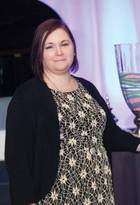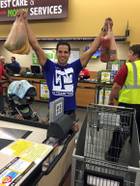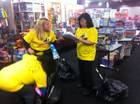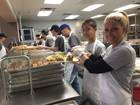The winners of Greenspun Media Group's Angel Awards exemplify the caring and compassion found throughout Southern Nevada.
Crystal Hill’s story is particularly unforgettable. Forced to deal with the tragic death of her son, she found a network of support to help her cope and now uses her story to help others.
Susie Lee devotes her time to making sure that students get the best chance to succeed. As the chairwoman of Communities In Schools, she’s bringing together local agencies with youth who need help the most.
When Jeff Civillico isn’t performing at the Flamingo, his Win-Win Entertainment is connecting charities with some of Las Vegas’ top performers. It’s a touch of Las Vegas glitz that brightens the day of hospitalized children and many more.
We’re thrilled to shine the spotlight on HELP of Southern Nevada, which is there to help the valley’s homeless population, among others.
On the business side of things, companies like Smith’s, Bank of America and the law firm of Brownstein Hyatt Farber Schreck have a culture of giving among their employees that we can all learn from.
-
Crystal Hill
Volunteer of the Year
On New Year’s Day 2013, Jesse Hill and his girlfriend were walking on the sidewalk when an impaired driver veered off the street and hit the duo. Hill was killed and his girlfriend, Anne-Marie, was critically injured.

Tragedy can bring out the best in people.
“Anne-Marie was asked to speak at an event and met Sandy Heverly, the executive director for STOP DUI,” said Crystal Hill, Jesse’s mother. “I asked if I could attend a Victim Impact Panel as a guest and began volunteering from there. It goes back to the basic human need to be with people who are like you, who understand you. The volunteers at STOP DUI had been through what I was going through. We are family by circumstance which — after the devastation and loss we suffer — makes us as close, if not closer than blood.”
As Hill explains, the Nevada Donor Network is helping families at the most stressful times in their lives. “Someone they love dearly is no longer living or is waiting for a life-saving/healing gift. (NDN is)fostering a community for donor families, recipients and those waiting for a life-saving gift.
“People do not want to talk about death, but we all are going to die. This makes it harder for those waiting for the gift of life; they know in order for their health to be restored, someone has to die and be able to see beyond their immediate situation to the lives that can be saved/healed by their final act of charity. NDN is a rare organization where all sides of donation meet.”
Volunteering of course takes time, a price Hill says she is happy to pay. “Honestly, I feel I receive far more from volunteering than I give. Society equates ‘donate’ with money, but giving of your time and talents is just as important and just as rewarding. There are people whose finances do not allow them to make monetary donations that others can. Maybe they can use their talents as web designer to design/update the organization’s website, volunteer their time mailing letters, doing research for a project, or participating in an event. Thinking that if someone I talked to about Jesse makes the decision to become a donor, not get behind the wheel impaired, or be a designated driver then it is as if Jesse is still giving.”
Society, Hill has found, does not view grief and the bereaved in a manner that would foster hope and encouragement. “Volunteering with these different organizations has helped me not feel isolated. I am not alone in my grief, in the torment of court hearing after court hearing, in the missed milestones, in my life being destroyed, and in my effort to adjust to my ‘new life’ after loss.”
Having family, friends, and people she interacts with have a conversation about donation because of her sharing her experience “is powerful,” she said. “If a person who heard me speak at a Victim Impact Panel stopped from getting behind the wheel (impaired) again then I made a difference. If by speaking to parents to explain the ways their children are abusing alcohol, prescription and illicit drugs makes the family talk about the issue, then I made a difference. If by speaking to students keeps them from getting behind the wheel or riding with someone who is impaired, then I made a difference. Volunteering is about making a difference. The difference you make is your choice.”
Hill points out that anyone can be a donor. Requirements for donation are not determined until death. Bone, cornea and tissue donation, she said, are not given the recognition they are due. “The gift of restoring sight through donated corneas, the power to heal burn victims through tissue donation, and the privilege of restoring mobility with bone donation must be given the same appreciation as an organ donation. Donors give everything they could and that should not be taken lightly or forgotten.”
Hill would like nothing better than to see others follow her example. “Do you remember when someone did something for you without wanting anything in return? It feels just as good — if not better — to be the one on the giving end. You can be a hero to someone in need by volunteering. What are you passionate about? What are your talents? The most rewarding volunteer experience will be when you are using your talents for something you are passionate about! And, don’t forget you can be a hero in life and beyond, be sure to register to be an organ/tissue donor at nvdonor.org and let your family know your wishes. Yes, that is a shameless plug.”
— Howard Riell
-
Susie Lee, Communities In Schools of Nevada
Humanitarian of the Year
As one of eight siblings raised in a working-class, single-income family in Ohio, Susie Lee recognized the significance of guidance and moral support from educators, advisors and other mentors.

Susie Lee
“It was nothing formal,” said Lee, whose own loving parents were simply spread a bit too thin. “But throughout high school and college, people stepped up and gave me a helping hand in a time of need, and it was the make-or-break difference. We all have a responsibility to help our young people have the highest level of opportunities.”
Given her affirming and fruitful youthful experiences as a mentoring recipient, Lee has committed her adult life to returning favor by helping others to succeed, achieve and believe in themselves.
Armed with a master’s degree in public management from Carnegie Mellon University, Lee moved to Southern Nevada in 1993 and quickly set out making a difference.
Lee has drafted several proposals that are now state policy and was the founding director of the Inner-City Games, which provided free citywide sports programming for kids prior to switching gears to focus on after-school programming, whereby it was redubbed After-School All-Stars. Lee has remained a dedicated member of the board for the local organization for more than 10 years and has also been active with nonprofits such as the Special Olympics and Nevada Women’s Philanthropy.
But Lee’s humanitarian star shines most brightly in her role as chair of the board of Communities In Schools of Nevada, a nonprofit organization dedicated to dropout prevention intervention throughout the Nevada school system. Founded in New York City more than 30 years ago, CIS’s mission is to surround students with a community of support that empowers them to stay in school and excel in life.
When Lee came on board with CIS of Nevada some five years ago, she restructured the organization in terms of service-delivery and set out to reorganize its leadership.
“We put together an incredibly strong board of directors, but most important was our decision to make the investment to hire full-time site coordinators within the schools we serve,” Lee said, adding that when she joined CIS of Nevada the organization served eight schools in Clark County; CIS of Nevada now serves 48 schools, including five in Elko and three in Washoe County.
“We discovered that a very simple yet significant ingredient in our service is the one-on-one relationship students develop with these caring adults. These are students dealing with daily trauma, such as violence in their neighborhoods, home insecurities and even wondering where their next meal is coming from. Our site coordinators are advocates for our students and knowing there is someone at the school ready to help makes all the difference for these kids.”
Last school year alone, CIS of Nevada reached about 45,000 students, providing hope and equal footing by removing the barriers presented because of socio-economic disadvantages. Based on the principle of accountability, CIS of Nevada earned some impressive boasting rights in 2014-2015: Lee said 97 percent of case-managed students in kindergarten through 11th grade were promoted to the next grade level, and 87 percent of case-managed seniors received their high school diplomas. (The Clark County School District reported an average graduation rate of 71.5 percent in 2013-2014, the most recent figures available.)
While CIS of Nevada offers some summer programming — and of course serves year-round schools — and hosts occasional events, the organization is particularly proud of the Fill the Bus school supply drive, held in partnership with News 3, Lotus Broadcasting and Sam’s Club. Last year’s event filled three buses with supplies.
“Last year we filled three buses, and now that we’re in more schools, we hope to do more,” Lee said, adding that the donations — from school uniforms to backpacks and classroom supplies for all ages — are used to stock a resource room at each school in which CIS of Nevada has a presence.
In addition to CIS of Nevada, over the past 20 years, Lee has also committed her time to Public Education Foundation, Teach for America, The Meadows School, Nevada Cancer Institute and Keep Memory Alive.
— Danielle Birkin
-
Bank of America
Foundation of the Year
Eleven years ago, the Bank of America Charitable Foundation initiated a program that has become a funding game-changer for local nonprofits.

The Neighborhood Builders Program awards a $200,000 unrestricted grant and leadership training for a nonprofit’s president and an emerging leader in the organization. It’s one of many philanthropic pushes for a foundation that injects about $2 million annually and thousands of volunteer hours into local charities.
Making an impact
Finding the right nonprofit each year for the Neighborhood Builders Program is no easy task. The foundation taps local leaders and decision-makers who are in tune with valley social and economic issues to help. The selected nonprofit must also tie into Bank of America’s mission to support housing, hunger and jobs.
“How we give is based upon those three pillars. Those are our priorities,” said Dan Giraldo, Bank of America senior vice president for enterprise business and community engagement.
Thanks to the program, in 2014, Goodwill of Southern Nevada was able to continue its Veteran Integration Program, which helps local veterans transition from military to civilian life and into a career by connecting them with resources ranging from job skills training to mental health services and other offerings. The program helped more than 200 veterans find work.
“We really liked how it was a holistic approach to help integrate veterans into the workforce,” Giraldo said.
Since 2004, the program has helped 19 valley organizations, including Nevada Partnership for Homeless Youth, Vegas PBS, Communities In Schools, HELP of Southern Nevada, Shade Tree and Boys and Girls Clubs. Nationally, the program has contributed $170 million to 800 nonprofits.
Training
The weeklong leadership training that comes with the grant can be invaluable, too. Nonprofit leaders can tap the foundation’s network of 2,000 nonprofit executives to learn of best practices and successful operational and fundraising strategies in their particular niche areas.
“Sure, it’s easy to give out $200,000 and call it a day. But we wanted to reinvest in the community. … We thought the best way to do that was to help with leadership training,” Giraldo said. “Some of the leaders will stay in contact with the other leaders and keep getting valuable feedback on what they’re doing. It helps to create a network and it actually helps them quite a bit.”
Nationally, the Neighborhood Builders Program has provided training for more than 1,700 people.
Employee involvement, other partnerships
Giraldo and other Bank of America brass are also proud of the 10,000 volunteer hours Bank of America employees give locally almost every year. The bank gives each employee two paid hours per week that can be donated to a local nonprofit by volunteering.
The company is flexible with how employees are allowed to use the hours. Employees can accumulate them and use them for a day of volunteering or use them in smaller increments.
“Whether we’re helping with our financial expertise, stuffing backpacks or giving out food at a shelter, it’s a great follow-up to the money we give,” Giraldo said.
The company also taps its financial expertise for volunteer efforts. Employees have visited valley elementary schools and other community programs to conduct financial literacy workshops.
The foundation also partners with the Public Education Foundation, Junior Achievement and Clark County to create the Summer Business Institute that allows high schoolers to participate in paid internships at about 80 businesses or organizations throughout the valley.
“Those kinds of collaborations are what we love. It brings local government, us as a corporate citizen and our nonprofits together to help our community,” Giraldo said.
The Bank of America Charitable Foundation has plenty of other partnerships for giving, too. In May, the foundation distributed 16 checks in 16 hours to 16 area nonprofits totaling $200,000.
It also has a partnership with Feeding America, a nationwide network of food banks. The collaboration has benefitted Three Square with $50,000 in funding in the past two years. The foundation contributes two dollars for every dollar donated to Three Square through Feed America.
“This is really just about making sure we’re in touch with our local community and helping address those often unseen needs it has,” Giraldo said.
— Brian Sodoma
-
Jeff Civillico, Win-Win Entertainment
Cultural Advocate of the Year
As a youngster growing up in Pennsylvania, Jeff Civillico “was that dorky kid doing magic and juggling shows in my kitchen,” said the entertainer, whose “Showtime with Jeff” performances were a hit with close family and friends.

Then as a high school freshman, Civillico completed a service project that took him out of his comfort zone — taking his act on the road to perform at a special-needs school near his home.
“The first show I ever did was a charity show and I just loved it, especially the idea of doing freebies,” said Civillico, who at 15 received a gold medal from the International Jugglers’ Association in the junior division.
He went on to attend Georgetown University — founding the Georgetown Performers’ Union — and earned a degree in theology from the institution. He performed professionally at theme parks, comedy clubs and on cruise ships, moving to Las Vegas five years ago, appearing in the now-defunct “Amazed” prior to moving to Nathan Burton’s magic show. He launched the family-friendly “Comedy in Action” at Planet Hollywood in the Forum Shops at Caesars, later moving the show to the Flamingo.
Meanwhile, Civillico remained true to his philanthropic roots, regularly performing gratis for various nonprofits, sometimes enlisting other local artists.
“When charities found out they could get free entertainment, word spread like wildfire and I became the go-to guy that charities would call,” Civillico said. “On the flip side, I had entertainers calling me and wanting to give back and I saw something bigger: There was nothing really in Las Vegas matching performers with charities, and I thought there should be, so in 2011
I founded Win-Win Entertainment as a natural extension of what I was doing on my own.”
Win-Win — a 501(c)(3) nonprofit — is dedicated to connecting great causes with great entertainment, one show at a time. What began as a one-man operation now has a full board and a roster of entertainers.
Civillico said Win-Win is on track to provide some 250 shows this year, with an average of three to five events per week.
“We have what we call our regular programming: Wednesday is hospital day, then we have Twilight Thursday shows at senior centers, Freedom Fridays where we work with the USO at Nellis and Creech Air Force bases, then Saturdays in the spring we go out to play baseball for Miracle League of Las Vegas with special-needs kids,” Civillico said. “We also help charities raise money by providing talent for their fundraisers at no cost.”
Civillico said a third component of Win-Win entails providing nonprofits with show tickets and other swag for silent auctions.
“We have relationships with entertainers and producers all over town, so it’s easy to say, ‘Hey, we need X-pairs of tickets for this fundraiser,’” said Civillico, adding that folks are typically receptive to requests and more than ready to lend a hand. “I founded Win-Win on the basic tenet that most people are generally good people, and maybe don’t give back more because life gets in the way. So we like to make it as easy as possible, and remove all the barriers so there are no excuses not to get involved.”
And get involved they do.
From headliners such as the Australian Bee Gees and Human Nature to technicians, wardrobe and makeup artists, Win-Win has grown into “something much broader and cooler than I had envisioned, with a very broad definition of entertainment,” Civillico said.
Case in point: Children in the hospital might not raise a brow for Nathan Burton but go nuts if Captain America pays them a visit.
“We never thought we’d be providing action heroes or face painters or stilt walkers, but we’re engaging more and more people in the community, some of whom have nothing to do with the entertainment industry,” said Civillico, who would love to see Win-Win go national, referencing Los Angeles as a logical place to expand.
Meanwhile, Civillico’s objective here in Southern Nevada is simple: “My next goal is what I call Project 365, where we continue ramping up and offering our services 365 days a year,” he said. “We’re close, and it’s just a matter of infrastructure. It’s amazing, because we started off so organically.”
As an additional personal philanthropic gesture, last fall Civillico launched Give-Back Sundays every week, where he donates 50 percent of his show proceeds to various organizations.
— Danielle Birkin
-
HELP of Southern Nevada
Nonprofit of the Year
When it comes to helping the disadvantaged and homeless to become self-sufficient, you’d be hard pressed to find a nonprofit that brings more to the table than HELP of Southern Nevada.
Started in 1970, HELP has been a key resource for Southern Nevada’s homeless youth, struggling adults, seniors on a limited income and everyone in between. Referrals to the agency come by word of mouth and result in helping more than 103,000 unduplicated individuals annually.
“Every client that comes through the door, we want to make sure to give them the time and whatever it takes to set them up to become self-sufficient,” said Abby Quinn, chief community relations officer for HELP. “We have different checks and balances to make sure clients are aiming towards self-sufficiency. ... We don’t want to be the forever solution though.”
Casting a wide net, work readiness
HELP of Southern Nevada covers many details in the self-sufficiency conversation. Seniors in need of weatherization assistance can tap HELP. Someone who has hit hard times because of a job loss and is in need of a suit for a job interview can seek out the nonprofit. A homeless person in need of a night of shelter can access resources through HELP.
In its fourth year, the HELP2O bottled water drive, a partnership with Whole Foods, has HELP staffers collect and distribute donated bottled water to the valley’s homeless population during the hot summer months.
One of its most popular and successful programs is WORC (Work Opportunities Readiness Center), which offers pre-employment services to help people re-enter the workforce.
Its weeklong job readiness workshops are popular, Quinn said. Participants can engage in mock interviews and be critiqued by a professional HR manager; they can also learn how to write cover letters and resumes and get access to job listings. “It’s something where we can really wrap the service around the needs of whoever comes in the door,” Quinn said.
The homeless
HELP’s Shannon West Homeless Youth Center currently houses 44 percent of the homeless youth in the city. Its bed capacity is about to nearly double from 65 to 120, as HELP is building out a new site behind its main campus on East Flamingo Road.
The expansion will bring needed services, including drug, alcohol and mental health treatment to more people; it is also a valuable move away from the city’s homeless corridor.
“That’s very important. You have people who are working on recovery, then the second they step outside the door (at the current location) there are so many temptations,” Quinn said.
The homeless population HELP staff sees brings a mix of stories. Some are youth who are aged out of foster care, others have recently been released from jail and are trying to get on their feet. There are families where the primary income provider lost work and many other situations. When helping transition to self sufficiency, Quinn said, shelter is a crucial first step.
“You have to house first, then you can figure out how to get them healthy, especially with youth on the streets,” she said.
Alternative sentencing, Framing Hope
HELP is also creative when it comes to fundraising. Some programs help the community while generating money for the nonprofit. HELP’s Alternative Sentencing and Framing Hope programs are key examples.
With alternative sentencing, HELP charges a small fee for every court-appointed individual looking to do community service work in lieu of jail time. These cases often involve misdemeanors for petty crimes or traffic citations.
The program takes the burden off the legal system to find legitimate community service opportunities for the defendants, as HELP steps in to coordinate the work among its more than 100 nonprofit community partners.
“The courts don’t have time to check with agencies, so this helps them a lot,” Quinn said. “It’s an important program to us that brings in unrestricted dollars.”
Framing Hope is a partnership between HELP of Southern Nevada, the Home Depot Foundation and Good360 that offers low-cost building supplies to area nonprofits, often at discounts as deep as 70 percent.
The supplies are donated by area Home Depot stores and allow area nonprofits to make repairs or remodel facilities for less so that they can use the savings for services. The program also serves as an important fundraising tool for HELP. To learn more about HELP of Southern Nevada and its many programs, visit helpsonv.org.
— Brian Sodoma
-
Brownstein Hyatt Farber Schreck
Philanthropic Business of the Year — Private
When business leaders say they want to give back to their community, they can look to Brownstein Hyatt Farber Schreck for inspiration.
“I can honestly say that it’s thanks to the great people who work for this firm that we are receiving this award,” said Ellen Schulhofer, the firm’s co-managing partner. “We have tremendous employees who contribute their time, talent and resources to make our community a better place.”
Whether through board service, hands-on volunteerism, financial contributions or pro bono legal work, most of the firm’s employees are involved in the community. In addition, the firm has a full-time director of community relations — an unusual position for a firm of its size to have — as well as a pro bono partner, both of whom help connect associates with the community, providing opportunities to engage and contribute through the firm’s philanthropy programs.
Philanthropy has been a priority for Brownstein Hyatt Farber Schreck from the beginning. Frank Schreck had long been involved in community causes, and when the Schreck firm decided to merge with Brownstein Hyatt & Farber, that culture was an important consideration. For more than 45 years, Brownstein has been giving back to local communities. The founding partners hung their shingle in the town where they were raised, and as they worked to build a business they contributed to the community and made serving on nonprofit boards and supporting charitable events a part of the firm’s culture. The law firm’s philanthropic activities include nonprofit board service (approximately 70 percent of its attorneys and policy professionals sit on nonprofit boards); employee volunteerism (“What we call our Karma Program,” says Schulhofer); pro bono legal services (“Our attorneys and policy professionals provided more than 11,000 hours of pro bono service last year.”) and significant financial contributions.
“We’re proud to incorporate so many different activities into our philanthropic work, but our board service is especially significant, as our people are key players in the strategic planning being done to address important issues in our community,” she said. “Our commitment to pro bono is also crucial, as it allows us to use the knowledge, skills and expertise we’ve honed through our various practices to help those who otherwise wouldn’t have access to legal services.”
The common thread that connects Brownstein Hyatt Farber Schreck’s philanthropic activities “is our employees’ passion,” Schulhofer said. “We want our people to be involved in organizations that are meaningful to them. Their passion truly drives the program, with the firm supporting the causes and organizations that are most important to the people who work here.”
The firm creates a place “where people care — about doing the highest quality work for their clients, about the people they work with and about the communities in which they live,” said Schulhofer. “It’s a culture where giving back is simply part of the way we do things, so much so that community involvement is an important consideration in the annual evaluation and advancement process for our attorneys and policy professionals.”
Everyone at the firm is encouraged to be involved in the community. Its director of community relations meets with each attorney and policy professional to help connect them to nonprofit organizations. Once involved, associates work both internally, engaging firm resources such as volunteers, pro bono services and financial support, and externally to make connections with donors and supporters.
Ahead?
“We have some great philanthropic collaborations planned in the coming months,” Schulhofer said. The firm’s employees, along with students and families from its adopted school, Halle Hewetson Elementary, will be participating in Nevada P.E.P.’s Run Walk & Roll Against Bullying event.
“One of our attorneys is the current board chair for Nevada P.E.P.,” she said, “so we’re thrilled to make the connection between this great organization and our adopted school.
The firm is also looking forward to returning to Three Square Food Bank with the legal team from Caesars Entertainment to pack food for children in need. It will also be inviting clients and their families to be a part of a clean-up day at Hewetson Elementary. “We’re also proud members of the Nevada Corporate Giving Council, and are excited to be partnering with Julie Murray and her wonderful team at Moonridge Group who will be providing board training sessions for our attorneys and policy professionals in the near future.”
And what does the law firm’s leadership say to others to convince them that they should follow their example?
“In addition to simply being the right thing to do, corporate philanthropy makes good business sense,” Schulhofer said. “Through our community engagement program, we are able to impact organizations and issues that are important to our employees, our clients and our communities while also providing important personal, professional and business development opportunities for our employees.”
— Howard Riell
-
Smith's
Philanthropic Business of the Year — Private
Smith’s Food & Drug Stores promotes philanthropic endeavors at both the corporate and employee-volunteer level — efforts directed at thwarting hunger are at the forefront of the company’s humanitarian accomplishments.

The retail chain — founded in 1932 in Northern Utah and now a subsidiary of the Kroger Co. — contributes about $11 million annually in funds, food and products to support the communities in which it operates.
In Nevada, where Smith’s has about three dozen stores and some 5,000 employees, the company ponied up $3.4 million in cash and products in 2014, with local food banks receiving $2.1 million in food.
“Nevada has an incredible network of food banks, including Three Square here in Las Vegas and Food Bank of Northern Nevada,” said Marsha Gilford, vice president of public affairs for Smith’s, which also operates in Utah, New Mexico, Arizona, Idaho, Montana and Wyoming. “We also donate cash every year to both (Nevada) food banks to help them cover operational costs. We aren’t a huge organization, but we try and do our little bit and always put our heart and soul behind it.”
With fighting hunger in Nevada the top community priority for Smith’s, each day Smith’s stores donate fresh but unsellable food, keeping it from landfills and supplementing items given to pantries.
“We call this grocery-rescuing,” said Gilford, who sits on the board of Three Square. “Say, for example, a beef roast has been marked down and doesn’t sell; we pull it the morning of the expiration date and freeze it for future donation to a food bank. Grocery-rescuing not only saves food from ending up in landfills, but also provides more nutritional offerings rather than manufactured items such as canned goods or cereal.”
In 2015, Smith’s launched its Nevada Community Rewards program, through which nonprofits can receive unrestricted donations up to $10,000 per year. The program is easy to use, entailing the mere swipe of a card. Enrolled customers can select local nonprofit organizations to receive their shopping rewards points.
To celebrate new stores, Smith’s donated $25,000 to Communities In Schools, employees assembled 50 new bikes for Big Brothers Big Sisters of Southern Nevada and several local high school bands were hired at $500 a pop as a way to give back to student music programs.
In addition, about 300 employees walked at the Making Strides Against Breast Cancer event, where Smith’s is the local presenting sponsor. Smith’s donated $30,000, along with bananas, water and granola bars. Additionally, Smith’s donates each year to the Nevada Health Centers Mammovan so underserved women throughout the state can receive free mammograms.
Female Smith’s associates hosted a Mother’s Day shopping event where invited children from the Shade Tree shelter were given $50 to spend on Mother’s Day gifts for their moms. Mothers were invited to relax in a private lounge and enjoy snacks while receiving health information. The Shade Tree was also given extra gift cards for families who were unable to leave the safety of the shelter to shop publicly.
During May, Smith’s also raised money for the St. Rose Dominican Health Foundation Charity Care Program, as it has for the past three years. This year, Smith’s will exceed $1 million in donations to the children’s hospital.
Smith’s has also sponsored the mini grocery store inside the Lied Discovery Children’s Museum for 20 years. This popular exhibit — “it’s way fun, and the kids love it,” according to Gilford — teaches children about grocery budgeting, nutrition and future career possibilities.
Smith’s is collecting change for the USO; Smith’s parent company Kroger will match all customer donations up to $1 million. The USO frequently collects snack and toiletry donations at store openings in the valley. Smith’s also sponsored a family barbecue at Creech Air Force Base for about 500 people and several Smith’s associates served at the event.
Throughout the year, hundreds of Smith’s associates also volunteer their personal time. Each year during “Make a Difference Day” employees donate more than 100 days of volunteer service. This year, they went door-to-door and installed new fire alarms in homes throughout Southern Nevada in partnership with the Red Cross. To date, this program has saved 13 lives that could otherwise have been lost due to ineffective or nonexistent home fire alarms.
“We want to help build and sustain the communities in which we live in a way that is meaningful to both our customers and our employees,” Gilford said. “We really are a part of the communities in which we operate.”
— Danielle Birkin






